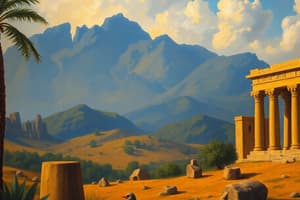Podcast
Questions and Answers
Which ancient civilization is known for the construction of the Hanging Gardens of Babylon?
Which ancient civilization is known for the construction of the Hanging Gardens of Babylon?
- Babylonians (correct)
- Sumerians
- Assyrians
- Greeks
What is Mesopotamia often considered as?
What is Mesopotamia often considered as?
- Cradle of civilization (correct)
- Center of the Renaissance
- Birthplace of democracy
- Birthplace of monotheism
Which ancient civilization is known for their military prowess and development of iron weapons?
Which ancient civilization is known for their military prowess and development of iron weapons?
- Babylonians
- Greeks
- Assyrians (correct)
- Sumerians
Where was ancient Egypt located?
Where was ancient Egypt located?
Which ancient civilization had innovations in writing, agriculture, and architecture?
Which ancient civilization had innovations in writing, agriculture, and architecture?
What is one of the most famous achievements of ancient Egypt?
What is one of the most famous achievements of ancient Egypt?
Where is ancient Greece located?
Where is ancient Greece located?
Who is known for their achievements in engineering, law, and politics?
Who is known for their achievements in engineering, law, and politics?
What was a significant contribution of ancient Greeks?
What was a significant contribution of ancient Greeks?
Which ancient civilization is often considered the cradle of Western civilization?
Which ancient civilization is often considered the cradle of Western civilization?
Flashcards are hidden until you start studying
Study Notes
Introduction
The history of ancient civilizations is a vast and fascinating subject, exploring the rise and fall of cultures that shaped the world as we know it. From the cradles of civilization in Mesopotamia and Egypt to the great empires of Greece and Rome, this article will delve into the rich tapestry of ancient history, providing an in-depth exploration of the people, events, and achievements that defined these early societies.
Mesopotamia
Mesopotamia, located in modern-day Iraq, is often considered the birthplace of civilization. The region was home to several ancient civilizations, including the Sumerians, Babylonians, and Assyrians. The Sumerians are known for their innovations in writing, agriculture, and architecture, as well as their contributions to the development of the wheel and the plow. The Babylonians, in turn, are famous for their legal and mathematical achievements, as well as the construction of the Hanging Gardens of Babylon, one of the Seven Wonders of the Ancient World. The Assyrians, known for their military prowess, developed iron weapons and fortification techniques that helped them expand their empire.
Ancient Egypt
Ancient Egypt, located in modern-day Egypt and Sudan, is another prominent ancient civilization. The civilization emerged around 3100 BCE and lasted until 332 BCE, with its most powerful period occurring from 1550 BCE to 1077 BCE. The ancient Egyptians were known for their achievements in art, architecture, and science, as well as their development of the first written language, hieroglyphs. Some of the most famous achievements of ancient Egypt include the construction of the Great Pyramids, the Sphinx, and the Valley of the Kings.
Ancient Greece
Ancient Greece, located in modern-day Greece, Turkey, and Italy, is often considered the cradle of Western civilization. The civilization emerged around 800 BCE and lasted until the end of antiquity. Ancient Greeks made significant contributions to art, philosophy, and drama, as well as the development of democracy and the Olympic Games. Some of the most prominent figures of ancient Greece include Plato, Aristotle, Socrates, and Homer.
Ancient Rome
Ancient Rome, located in modern-day Italy, was a powerful and influential civilization that emerged around 753 BCE. The Roman Republic, which began around 509 BCE, marked a period of political turmoil and expansion, while the Roman Empire, which began around 27 BCE, was a period of stability and prosperity. The Romans are known for their achievements in engineering, law, and politics, as well as their contributions to the Latin language and the development of the Roman Catholic Church.
Conclusion
In conclusion, the history of ancient civilizations is a rich and diverse subject, encompassing the rise and fall of cultures that have shaped the world as we know it. From the cradles of civilization in Mesopotamia and Egypt to the great empires of Greece and Rome, these ancient societies have left an indelible mark on human history, with their achievements and innovations continuing to influence our lives today.
Studying That Suits You
Use AI to generate personalized quizzes and flashcards to suit your learning preferences.




